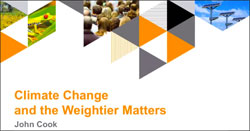Climate Change and the Weightier Matters: a Christian view on global warming
Posted on 13 September 2012 by John Cook
The Centre for the Study of Science, Religion and Society at Emmanuel College are running a series of presentations on Science, Religion and Society. I was honoured to be invited to talk about a Christian view on climate change, which I presented on 03 August 2012. Here is a video of the presentation, with an introduction by Stewart Gill, principal of Emmanuel College.
The talk goes for 50 minutes as I cover climate science, an investigation into a Biblical view of social justice and why climate change is an important issue for Christians. Then I debunk misinformation from the Cornwall Alliance. If you're time compressed and want to jump to a particular section of the talk, here are the key bookmark points:
- 6:06 - Five key facts you need to know about climate change
- 25:15 - Why Christians should care about climate change
- 29:14 - Comparing the Evangelical Climate Initiative to the Cornwall Alliance
- 32:29 - Debunking misinformation from the Cornwall Alliance
 I've uploaded the slides for this presentation in PDF format (2.9Mb). Anyone is welcome to use any of the slides from my talk in their own presentations (except the graphics I don't have the rights to such as the Simpsons screenshot or the cute sheep/goat photo). I've also compiled public talks I've given in the past that have made it onto YouTube, available at http://sks.to/talks.
I've uploaded the slides for this presentation in PDF format (2.9Mb). Anyone is welcome to use any of the slides from my talk in their own presentations (except the graphics I don't have the rights to such as the Simpsons screenshot or the cute sheep/goat photo). I've also compiled public talks I've given in the past that have made it onto YouTube, available at http://sks.to/talks.































 Arguments
Arguments























 0
0  0
0






Comments